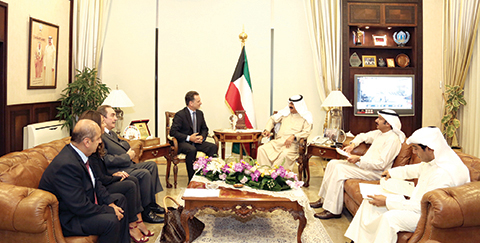KUWAIT: Nazaha, in partnership with the British Embassy Kuwait and the Global Partners Governance Foundation (GPG), announced the official launch of a pioneering accreditation system for Kuwait’s public sector entities. This initiative marks a significant step towards fostering transparency and integrity within Kuwait’s governmental organizations. The accreditation system serves as a means of incentivizing adherence to the public officials’ Code of Conduct. By recognizing and rewarding entities that demonstrate a commitment to rigorous standards of professional and ethical behavior, the scheme aims to cultivate a culture of accountability in Kuwait’s public sector.
Five government entities have participated in the pilot of phase of the accreditation system: the Kuwait Direct Investment Promotion Authority, the Anti-Corruption Authority, the Environment Public Authority, the Public Authority for Food and Nutrition, and the Public Institution for Social Security. Today these agencies were awarded a ‘bronze’ status for their ongoing efforts to implement ethical practices. Secretary General of Nazaha, Salem Ali said: “Signed by Kuwait in 2003, the United Nations Convention against Corruption (UNCAC) encourages State Parties to adopt and circulate codes of conduct for the correct, honorable, and proper performance of public functions.
The “Adaa” initiative (translates to “Performance”) aims to ensure the implementation of the codes of conduct circulated by the Civil Service Commission (CSC), in cooperation with Global Partners Governance. The initiative has developed a program that will contribute to the optimal and effective implementation of public officials’ codes of conduct, in line with international standards and best practices as implemented by several ambitious state institutions that will share their experiences in this first series of our conference.’”
The British Ambassador to Kuwait, Belinda Lewis, said: “The British Embassy has been supporting Nazaha on its anti-corruption awareness, prevention and detection work since September 2022. This new accreditation scheme is a way of acknowledging publicly the implementation of ethical practices in government agencies. This increases trust in public service delivery, and also has a positive ripple effect for companies and investors who are looking for transparent and stable operating environments.”
Greg Power, Founder and Chairman of the Board at UK-based NGO GPGF, said: “The launch of this accreditation system is an important milestone in Kuwait’s wider anti-corruption strategy. Thanks to the British Embassy’s support we are delighted to have played a role in helping Nazaha to develop this innovative approach to promoting ethical conduct and driving positive change in the public sector.” The introduction of the accreditation system represents a significant step forward in Kuwait’s ongoing efforts to combat corruption and promote good governance.











